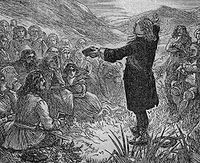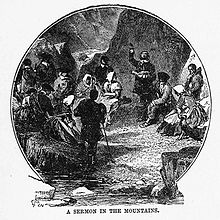- Conventicle Act 1664
-


A Covenanters Conventicle.[1] The Conventicle Act of 1664 was an Act of the Parliament of England (16 Charles II c. 4) that forbade conventicles (religious assemblies of more than five people outside the auspices of the Church of England). This law was part of the Clarendon Code, named after Edward Hyde, 1st Earl of Clarendon, which aimed to discourage nonconformism and to strengthen the position of the Established Church. However the Clarendon Code was not actually the work of Clarendon himself, who favoured a policy of greater tolerance towards dissenters.[2] These prohibitions led many, such as the Covenanters, to vacate their parishes rather than submit to the new Episcopal authorities. Just as the ministers left so too did the congregations, following their old pastors to sermons on the hillside. From small beginnings these field assemblies-or conventicles-were to grow into major problems of public order for the government.
Other statutes that were part of the Clarendon Code include:
- the Quaker Act, 1662, which required people to swear an oath of allegiance to the king, which Quakers did not do out of religious conviction.
- the Act of Uniformity 1662, 14 Charles II c. 4 (1662), which required the use of all the rites and ceremonies in the Book of Common Prayer in church services;
- the Five Mile Act, 17 Charles II c. 2, (1665), which sought to prevent nonconformists from living in incorporated and chartered towns.
The operation of these laws at least as far as Protestants were concerned was mitigated somewhat by Charles II's Royal Declaration of Indulgence in 1672, which suspended the execution of penal laws and allowed a certain number of non-conformist chapels to be staffed and constructed, with the pastors subject to royal approval.
The Conventicle Act and Five Mile Act were repealed in 1689.
(The '16 Charles II c. 2' nomenclature is reference to the statute book of the numbered year of the reign of the named King in the stated chapter. This is the method used for Acts of Parliament from before 1962.)
Jewish reaction
Although aimed at Nonconformists, when the Conventical Act was passed, the Jews led by their new rabbi, Jacob Sasportas, took their anxieties to Charles II, who told them, ‘laughing and spitting’, not to worry; later the Privy Council put it in writing that Jews could ‘promise themselves the effects of the same favour as formerly they have had, so long as they demean themselves peaceably and quietly, with due obedience to His Majesty’s laws and without scandal to his government’. Thus the English Jews, by an act of omission, as it were, became full citizens, subject to no more disabilities than those inherent in their own unwillingness, like Catholics and Nonconformists, to belong to the Church of England or, in their particular case, to swear Christian oaths.[3]
References
- ^ Lawson, Rev. R. (1885). Maybole Past and Present. Pub. J. & R. Parlane. P. 49.
- ^ History Learning Site - Clarendon Code
- ^ Paul Johnson, A History of the Jews, p.278
- 'Charles II, 1664: An Act to prevent and suppresse seditious Conventicles.', Statutes of the Realm: volume 5: 1628-80 (1819), pp. 516-20. URL: http://www.british-history.ac.uk/report.asp?compid=47357. Date accessed: 5 March 2007.
 United Kingdom legislation
United Kingdom legislationPre-Parliamentary legislation Acts of Parliament by states preceding
the Kingdom of Great BritainActs of the Parliament of England to 1483 · 1485–1601 · 1603–1641 · Interregnum (1642–1660) · 1660–1699 · 1700–1706
Acts of the Parliament of Scotland
Acts of the Parliament of Ireland to 1700 · 1701–1800Acts of Parliament of the
Kingdom of Great Britain1707–1719 · 1720–1739 · 1740–1759 · 1760–1779 · 1780–1800
Acts of Parliament of the United Kingdom of
Great Britain and Ireland and the United
Kingdom of Great Britain and Northern IrelandChurch of England Measures Legislation of devolved institutions Acts of the Scottish Parliament
Acts and Measures of the Welsh Assembly
Acts of the Northern Ireland Assembly / of the Northern Ireland Parliament
Orders in Council for Northern IrelandSecondary legislation Categories:- Acts of the Parliament of England concerning religion
- 1664 in law
- Covenanters
- English Reformation
- Religious persecution
- 17th-century laws in Christianity
- 1664 in England
- Church and state law
- Calvinism stubs
Wikimedia Foundation. 2010.


